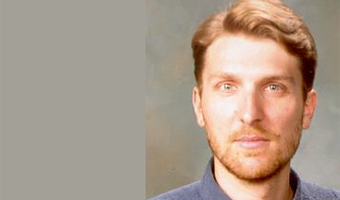By Kaitlyn Pacheco
From Compass
With the rising popularity of yoga in the Western Hemisphere, some yoga practitioners, teachers and scholars have questioned how the ancient practice has been modernized. Andrew J. Nicholson addressed these concerns during his presentation “Is Yoga Hindu? A Talk on the Modern Development of Yoga” on April 7.

Dr. Andrew J. Nicholson
Nicholson’s talk took place in Ellis Hall as part of the biannual Ohio University Gawande Lecture Series. During his 45-minute lecture, Nicholson spoke about the connection between the historical roots of yoga and current practices, as well as his opinion on how yoga has globalized over the past few decades.
“His [Nicholson’s] topic reflects some recent work he has been doing on the development of yoga, which tends to appeal to non-academic audiences and also coincides with a new class I am teaching this semester, CLRW 3480: The History of Yoga,” said Dr. Brian Collins, Drs. Ram and Sushila Gawande Chair in Indian Religion and Philosophy and creator of the Gawande Lecture Series.
Nicholson, professor in the department of Asian and Asian American Studies at State University of New York at Stony Brook, spoke to an audience of more than 30 students, faculty members and visiting professionals about the evolution of yoga.
He discussed specific historical terms and techniques and explained how practices such as posture, mantras and breath control have changed over time.
“Because yoga is a living tradition, it’s going to change over time to fit the different needs of people in different eras and geographical locations,” Nicholson said. “I don’t think that this anxiety over authenticity that so many people seem to have is warranted.”
A large part of Nicholson’s talk was dedicated to the question of whether or not it is fundamentally acceptable for Western people to practice yoga since it was traditionally practiced in Northern India. He presented information from as far back as the pre-modern era that showed people of all races, cultures and religions practicing yoga.
Nicholson also discussed how yoga has become a globalized practice over the past few decades. He believes the transformation of yoga that happened in Europe and North America has been re-imported to India, and has affected the way that people from India perceive their own yoga. He describes this phenomenon as “the pizza effect.”
“In Italy, there used to be this thing called pizza that was just some bread with sauce on top, but after it hits the United States we go crazy with it and add cheese, toppings and everything. It then gets re-imported to Italy and this new kind of pizza becomes their official national dish,” Nicholson explains. “I think there’s some truth to the argument that many of the things Indians consider most quintessentially Indian are in fact examples of a kind of global culture that have transformed Indian practices in interesting new ways to be relevant to not just Indians, but to other people as well.”
Collins said Nicholson’s ideas reflect what he teaches students in his History of Yoga class. Collins said his class examines how misleading it is to trace yoga to only one source since it has developed over thousands of years in the context of cultural borrowings and conversations.
“I think everyone came away with a better picture of just how complicated and difficult it is to make claims about what counts as ‘real yoga’ and what doesn’t,” Collins said.
The Gawande Lecture Series was established in 2013, following the creation of the Drs. Ram and Sushila Gawande Chair in Indian Religion and Philosophy in 2012. The position was created in honor of Ram Gawande, and is supported by the couple’s non-profit charity, the Student & Education Support Association Inc.
After accepting the Drs. Ram and Sushila Gawande Chair position in 2013, Collins launched the Gawande Lecture Series to bring internationally renowned scholars of Indian religions to OHIO to present their work.



















Comments